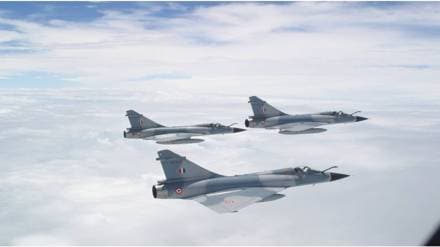Defence industry giants are facing serious investigations into corruption allegations. Rolls Royce, BAE Systems, and Thales, well-known international defence firms, are being scrutinised for their involvement in two separate defence scandals. The former concerning the two British companies are related to the Hawk 115 Advanced Jet Trainer aircraft deal, while the latter involves the French firm in relation to Mirage 2000 upgrades.
The Central Bureau of Investigation (CBI) in India is focusing on Tim Jones, Director of Rolls Royce India, as well as Sudhir Choudhrie and Bhanu Choudhrie, known figures in the arms dealing world. The investigation claims that these individuals, along with BAE Systems, colluded with unidentified public officials to gain illegal profits and kickbacks in the Hawk aircraft acquisition between 2003 and 2012.
Rolls Royce is accused of making improper payments to middlemen, which goes against the terms of their contract. Rolls Royce has pledged to cooperate fully with the Indian investigators, maintaining their commitment to ethical practices.
Meanwhile, French defence company Thales is under a separate investigation for alleged bribery related to a contract for upgrading India’s Dassault Mirage 2000 planes. The investigation focuses on the use of covert bribes disguised as contract payments. Thales, on the other hand, denies these allegations and claims to have a clean record with French financial prosecutors.
The scandal surrounding the Hawk jet deal also brings attention to Sudhir Choudhrie and Bhanu Choudhrie, two significant figures known for their alleged involvement in defence controversies in India. Sanjay Bhandari, another alleged intermediary, has found himself amid controversies surrounding the Mirage 2000 upgrades. Incidentally the alleged middlemen in these cases live in London however both matters are separate and are not known to be related in any way.
The accusations suggest that the Choudhries conspired with yet-to-be-named officials to fraudulently acquire the Hawk aircraft, a deal worth GBP 734.21 million. If these allegations prove true, it could further consolidate the Choudhries’ influence over India’s defence procurement.
India’s defence procurement process has long been plagued by bureaucracy, secrecy, and corruption allegations. Corruption remains a persistent issue despite efforts to increase transparency and reform, such as the introduction of the Defence Procurement Procedure in 2002 and the Defence Acquisition Procedure in 2020.
These scandals involving Rolls Royce, BAE Systems, and the Choudhries emphasise the urgent need for enhanced transparency and vigilance in India’s defence and aerospace sectors. As the investigations progress, the revelations could have far-reaching consequences for defence procurement domestically and globally. This incident serves as a reminder of the challenges faced by India’s defence industry, highlighting the controversial role of intermediaries in procurement deals.
Accused Firms Respond
In the wake of recent corruption allegations, Rolls Royce, BAE Systems, and Thales have issued responses, each maintaining their commitment to high ethical standards and rejecting misconduct.
A spokesperson for Rolls-Royce plc in London issued a statement addressing the allegations, confirming the company’s active cooperation with the Indian authorities. They referred to the Deferred Prosecution Agreement (DPA) with the UK’s Serious Fraud Office in 2017, wherein the ongoing investigation’s issues were disclosed. The spokesperson also emphasized that the DPA does not imply guilt or a criminal conviction for Rolls-Royce. “Rolls-Royce today is a fundamentally different business,” the spokesperson stated. “We will not tolerate business misconduct of any sort and are committed to maintaining high ethical standards.”
When asked about internal processes, the spokesperson mentioned that the company had radically transformed its internal ethics and compliance procedures, leading to the expiration of the DPAs with the UK’s Serious Fraud Office and US Department of Justice. However, they declined to comment on the specific steps Rolls Royce was currently taking in response to this investigation. In terms of the company’s future in India, the spokesperson asserted that “India remains an important market for Rolls-Royce, and we have a valued ecosystem of skilled people and partners in the country.”
Meanwhile, a spokesperson for BAE Systems stressed their commitment to ethical conduct, though they refrained from commenting on the ongoing investigation. “We are committed to maintaining high standards of ethical conduct that our customers, shareholders, partners, and colleagues expect,” the spokesperson stated.
Thales, on the other hand, has strongly denied allegations related to the Dassault Mirage 2000 aircraft modernisation programme. In their statement, Thales clarified that they had never been questioned by the French financial prosecution (Parquet National Financier) concerning this subject. Furthermore, they confirmed that no contract had ever been signed with Mr Sanjay Bhandari or his companies in relation to this project. “Thales firmly denies the allegations made by Mr Bhandari regarding the sums allegedly due or any other payments to him by Thales SA,” the statement read. They further highlighted their zero-tolerance policy on corruption and influence peddling, reaffirming the Group’s commitment to adhering to applicable legislation and best practices.
These scandals, encompassing three of the world’s major defence companies, underscore the complexity and challenges of international defence procurement. As the investigations continue, the ramifications will be closely watched, both within India and across the global defence industry.
